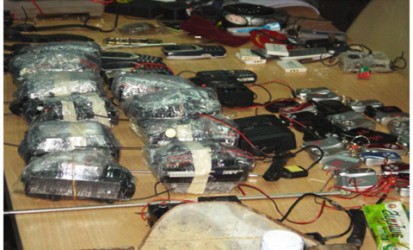Between the lines of the court’s death penalty verdict
 Without any media publicity, the Narathiwat provincial court on March 16 sentenced to death five men after they were found guilty of terrorism, illegal assembly to commit crimes and illegal possession of firearms and explosive materials. The six defendant was given 27 years jailterm.
Without any media publicity, the Narathiwat provincial court on March 16 sentenced to death five men after they were found guilty of terrorism, illegal assembly to commit crimes and illegal possession of firearms and explosive materials. The six defendant was given 27 years jailterm.
The five convicts condemned to death are Manasae Ya, Wae Asming Waema, Mohamad Sorheemee Ya, Mafaree Bueraheng and Arong Bakoh. Ruslee Doloh was jailed for 27 years. The seventh defendant, Mama Koiree Luemae, was bailed out during the trial and has since escaped.
Legal experts and security officers have hailed the court’s verdict as a good example of a legal case which was meticulously prepared and investigated in a systematic manner.
The conviction was based on incriminating evidences, including forensic tests, against the defendants none of them were caught in the act of planting or setting off a bomb. They were not tortured or forced to make confessions.
Their arrest was attributable to a complaint about a bomb explosion at a rubber plantation in Muang district of Narathiwat by the owner of the plantation on the night of July 2, 2007. A police force was rushed to the scene the next morning. They found a bomb crater and traces of blood indicating that one of the bombers might have been wounded after he accidentally set off the bomb. Police traced the blood trail to the Burapha Islamic school about two kilometers away.
Reinforcements were called in to raid the school. Thorough searches led to the arrest of seven men and the discovery of some firearms which included two pistols and one shotgun and several bomb-making materials, including gun power, ammonium nitrate fertilizer, cans filled with petrol and mobile phone SIM cards.
One significant find from the hard disc of a computer destop was the copy of a letter addressed to the Narathiwat federation of teachers apologizing for the murder of three teachers namely Mrs Thippaporn Tassanopas, Ms Yupa Sengwat and Sommai Laocharoensuk on June 11, 2007. The letter was signed by a group called the Islamic Warriors of Pattani.
Forensic tests found traces of explosives in the towel of one of the defendants, in the driving wheel and console of a sedan parked in front of a lodging in the school compound. Explosives traces were also found in the trousers of the other defendants.
Tests also showed DNA of the defendants on several items in the lodging – a sign that they had been living in the lodging for some time and not just for a short visit as claimed by the defendants.
The Burapha Islamic school is a boarding school and is therefore constantly monitored by teachers to prevent unauthorized outsiders to get in. Authorities believed that only with the consent of the school director, the defendants were able to live in the compound. The defendants claimed that they merely visited the school and did not stay there.
--------------------------------------------------------------------------------------------------------------------------------------
Caption : Tangible evidences in Islamburapha case
